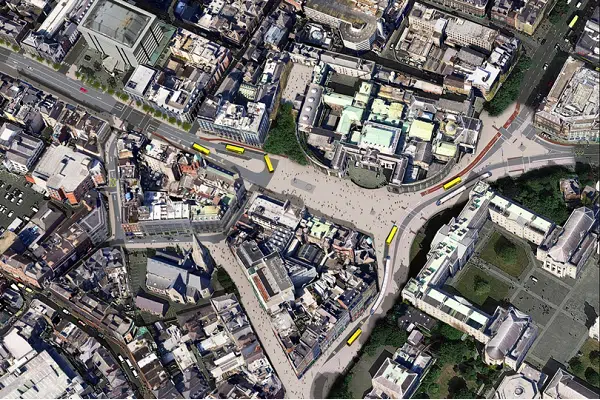
![]()
Plans to pedestrianize the College Green area have been pushed back to 2024, six years after Dublin City Council’s previous plans for the civic plaza were rejected by An Bord Pleanála. New plans published by the council last November had shown plans for a traffic-free pedestrian and cycle plaza had doubled in size compared to previous designs.
The new plans would see a plaza running from College Green to Dame Street junction, and South Great George’s Street. Buses, cars, and taxis will be banned from the area of Trinity College for a distance of 350m, with deliveries permitted until 11am. The council at the time said it intended to submit a fresh application to An Bord Pleanála for the scheme by last summer.
However, councillors were today informed that the council wishes to instead appoint a team of consultants early next year. The team could then prepare the application and would “hopefully” see them lodge a planning application by the end of next year.
“In 2023 we would hopefully be getting planning and going through a procurement process for a contractor with a view to being in a position to start work on College Green in early 2024,” Frank Lambe, senior executive officer with the council, said.
Lambe adds that this timeframe would tie in with the implementation of the BusConnects programme in the College Green area. Previous plans for the plaza had been rejected by An Bord Pleanála in 2018, due to concerns about the “significantly negative impacts” it would have on bus travel, and on traffic - particularly on the city quays.
In September 2020, final plans for a redesigned bus network for the city had been published by the National Transport Authority. These plans would have seen buses routed away from the College Green and east Dame Street area to facilitate the plaza.
Plans for the new plaza have been in preparation since 2015, with the council proclaiming that the traffic-free area is essential to the smooth running of the Luas Green line. Submitting an application to the board in May 2017, a planning hearing was scheduled for January 2018. However, the hearing had to be postponed days before it was due to begin because of errors in a newspaper notice published by the council.
Although the hearing was rescheduled for March, it took three weeks instead of the scheduled three days. When a decision was due in April 2018, several postponements had convinced the board to reject all plans that November. At the time, it had been reported that the council would submit a new application the following year.